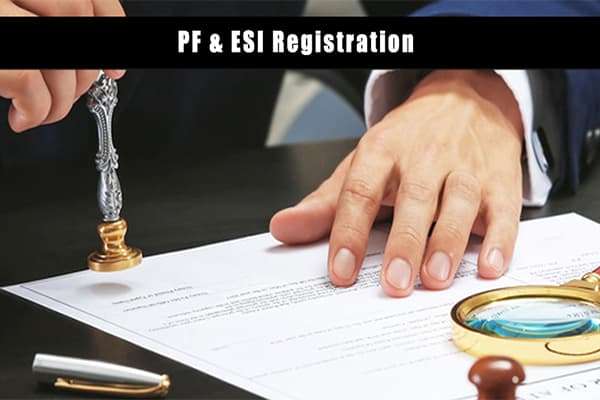EPF & ESIC Registration and Return Filing
EPF & ESIC Registration and Return Filing
EPF (Employees’ Provident Fund) and ESIC (Employees’ State Insurance Corporation) are two key social security schemes implemented by the Government of India to provide financial protection and health benefits to employees. Employers with 20 or more employees are mandated to register under the EPF scheme, while those with 10 or more employees (in most states) earning wages below the prescribed limit must register under ESIC. EPF Registration ensures employees save a portion of their salary for retirement, with employers also contributing a matching amount. ESIC Registration provides employees and their dependents access to medical care, maternity benefits, disability compensation, and other health-related services.

PF Return Filing
Filing Employee Provident Fund (EPF) returns is a crucial compliance requirement for all establishments registered under the Provident Fund Act. Timely submission of monthly returns and adherence to EPF due dates are vital to avoid penalties and ensure legal compliance. At Stride Tax, we understand the importance of fulfilling this statutory duty and are committed to making the process seamless for you. Our team of seasoned professionals offers end-to-end assistance, guiding you through every stage of the EPF return filing process. With our expert support, you can stay compliant with confidence and focus on your core business operations.
EPF Scheme
The Employees’ Provident Fund (EPF) Scheme, introduced by the Government of India, is a social security initiative designed to encourage long-term savings among employees and provide financial stability after retirement. Through monthly deductions from their salaries, employees gradually build a corpus that can be withdrawn upon retirement or under specific conditions.
Under this scheme, both the employer and employee contribute 12% of the employee’s basic salary each month. Of the employer’s share, 3.67% goes directly into the employee’s EPF account, while the remaining 8.33% is allocated to the Employees’ Pension Scheme (EPS).
EPF funds can be withdrawn under certain circumstances, such as retirement at the age of 58 or later, two months of continuous unemployment, or in the unfortunate event of the employee’s death. The scheme not only promotes savings discipline but also offers a financial cushion during post-employment years or unforeseen situations.
PF registration
PF registration is the formal process through which an employer registers with the Employees’ Provident Fund Organization (EPFO) to offer Provident Fund (PF) benefits to their employees.
Registration is compulsory for businesses employing 20 or more people, while those with fewer employees can opt in voluntarily to extend PF benefits. Upon successful registration, the establishment is assigned a unique PF code, which is essential for handling all PF-related activities such as contribution payments, withdrawals, and return filings.
Even companies with fewer than 20 employees can choose to register and provide social security coverage under the PF scheme. Once registered, employers are required to submit monthly PF returns in order to comply with statutory requirements and avoid penalties.
This system not only ensures legal compliance but also helps in securing employees’ financial future through consistent savings and retirement benefits.
PF return filing
PF return filing is the process of submitting detailed information to the Employees’ Provident Fund Organization (EPFO), and it is mandatory for all employers registered under the Provident Fund scheme. These filings must be completed monthly, with the due date set as the 25th of each month. Timely payment and return submission are crucial to avoid penalties and ensure regulatory compliance.
During PF return filing, employers are required to provide specific details, including the total contributions made by both the employer and the employee, employee-wise information, PF account numbers, and other relevant data for all individuals covered under the scheme. This ensures accurate record-keeping and helps employees track their PF balances and benefits effectively.
Who is Required to File PF Returns?
Organizations covered under the Employees’ Provident Funds and Miscellaneous Provisions Act, 1952 are required to file PF returns on or before the specified due date. This includes establishments employing 20 or more workers, as well as those with fewer than 20 employees that have opted for voluntary registration under the Act.
PF Return Due Date
The due date for filing PF returns depends on the type of establishment:
Private Sector Establishments
Private companies are required to file PF returns monthly, with the due date falling on the 15th of the following month.
Example: For the month of January, the PF return must be submitted by February 15th.
Government Establishments
Government bodies typically follow a quarterly return filing schedule. Returns must be filed by the end of the month following each quarter.
Example: For the quarter ending March 31st, the return is due by April 30th.
Additionally, both private and government establishments must adhere to deadlines for monthly PF deposits and annual return filings, as outlined below:
Type Due Date
PF Payment On or before the 15th of each month
PF Annual Return 25th April every year
Failure to meet these deadlines can result in penalties, interest charges, and legal consequences under EPFO regulations.
Documents Required
- Contribution made by the employer towards the Employees’ Provident Fund (EPF)
- Contribution deducted from the employee’s salary towards EPF
- Copy of the ECR (Electronic Challan cum Return) challan
- UAN (Universal Account Number) details of employees, along with updated KYC information
